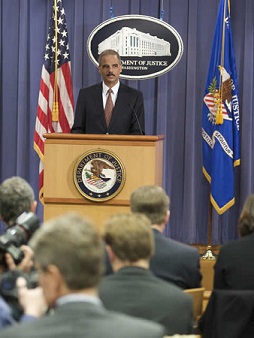
Opponents of religious hiring (again) demand AG Holder to act
Last week, 90 “religious, education, civil rights, labor, LGBT, women’s, and health organizations” asked Attorney General Eric Holder to “review and withdraw” a 2007 legal memorandum from the Department of Justice’s Office of Legal Counsel (OLC) This is the Nth time many of these groups have made the same request, alleging that the OLC memo illegally and unconstitutionally gives religious groups “blanket exemptions to non-discrimination laws.”
In the memo, OLC interpreted the Religious Freedom Restoration Act to permit a faith-based organization that considers religion in hiring to take part in a federal program that bans religious (and other) job discrimination by participating organizations. The Obama administration recently applied this interpretation to the Violence Against Women Act (VAWA), to which Congress in 2013 attached a broad nondiscrimination requirement. The administration said that faith-based organizations that hire by religion are not barred from the program if they can truthfully certify that both religious hiring and participation in the program (to be able to offer expanded services) are religiously important to them.
To the signers of the last week’s letter, all of this is nonsensical: religious hiring is suspect and surely it cannot be done on the federal government’s dime. Surely RFRA cannot override congressional action to specifically add broad nondiscrimination language to a program like VAWA! But the OLC memo rightly observes that a ban on religious hiring by faith-based organizations that receive federal dollars can hardly be the “compelling interest” required to justify imposing a “substantial religious burden” on the faith-based groups–since Congress routinely designs federal funding programs without any job discrimination limits at all, and sometimes specifically states its desire to protect religious hiring by participating groups!
RFRA is the premier federal law to protect religious exercise, including the religious practices of faith-based organizations. Does it apply when a federal program includes a ban on religious hiring? Here’s the answer of premier church-state expert Douglas Laycock:
“Does government substantially burden the exercise of religion, within the meaning of RFRA, when it offers monetary grants on condition that a religious organization abandon one of its religious practices? Yes, it does. Such a conditional offer of funding forces the religious organization either to abandon its religious exercise in order to fund its program, or to forfeit potential funding in order to maintain its religious exercise. As the Supreme Court has long recognized, this amounts to a financial penalty on the exercise of religion.”
